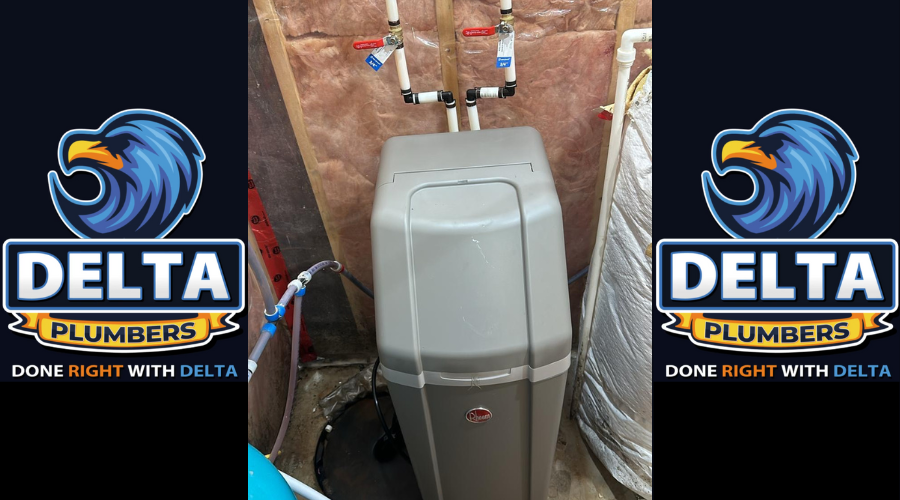Water softeners are becoming increasingly popular, especially in regions where hard water is a common issue. If you’re considering installing a water softener in your home or business, it’s essential to understand the wide range of benefits it provides. Hard water contains a high concentration of minerals like calcium and magnesium, which can cause issues ranging from clogged pipes to dry skin and hair. Installing a water softener can solve many of these problems and improve your overall water quality. In this comprehensive guide, we’ll explore the benefits of installing a water softener, answering common questions such as whether it’s worth the investment and how it can improve your daily life.

Picture Source – Delta Plumbers
Is it Worth It to Install a Water Softener?
The first question most homeowners ask when considering a water softener is whether it’s a worthwhile investment. The answer is yes, particularly if you live in an area with hard water. Hard water can lead to numerous problems, including damage to appliances, increased energy costs, and a less comfortable living environment. Here’s why installing a water softener is worth it:
1. Extends the Lifespan of Appliances
Hard water leads to mineral buildup in appliances like dishwashers, washing machines, and water heaters. Over time, this reduces their efficiency and lifespan. By installing a water softener, you’ll prevent this buildup, ensuring your appliances work more efficiently and last longer.
2. Reduces Energy Bills
When minerals accumulate in your water heater, it has to work harder to heat the water, increasing energy consumption. Soft water heats more efficiently, leading to lower energy bills.
3. Improves Plumbing Systems
Hard water causes scale buildup in your pipes, reducing water flow and increasing the risk of clogs. A water softener prevents this issue, saving you money on plumbing repairs and improving your home’s water pressure.
4. Better for Your Skin and Hair
Soft water is gentler on your skin and hair. If you’ve been dealing with dry skin or brittle hair, a water softener can make a noticeable difference.
Also Read: Benefits of a Tankless Water Heater

Picture Source – Delta Plumbers
What Are the Advantages of a Water Softener?
Water softeners offer a wide range of advantages that can improve the quality of your water and overall living conditions. Here are the most significant benefits of installing a water softener:
1. Prevents Mineral Stains
Hard water often leaves unsightly stains on your faucets, sinks, and bathtubs due to its high mineral content. Soft water eliminates this issue, helping to keep your bathroom and kitchen surfaces spotless.
2. Softer Laundry
Hard water makes your laundry feel stiff and scratchy because it prevents detergent from lathering properly. With soft water, your clothes will come out of the wash feeling softer and cleaner, and they’ll retain their colors longer.
3. Increased Water Heater Efficiency
A water heater can become up to 30% less efficient when hard water causes limescale to build up inside. With soft water, your heater will work at peak efficiency, leading to faster water heating and reduced energy consumption.
4. Improved Soap Lathering
One of the more noticeable effects of hard water is the difficulty it creates when trying to form a lather with soap or shampoo. Soft water improves soap and detergent performance, making it easier to clean everything from your body to your dishes.
5. Environmental Benefits
Using soft water means you need less detergent, soap, and energy to complete household chores. This reduction in resource use can contribute to a lower carbon footprint, making it an eco-friendly choice.
Also Read: Green Plumbing Solutions: Eco-Friendly Tips for Your Home

Picture Source – Delta Plumbers
Does a Water Softener Improve Water Quality?
Yes, a water softener significantly improves water quality, particularly in areas where hard water is prevalent. Here’s how:
1. Removes Hard Minerals
The primary function of a water softener is to remove hard minerals, particularly calcium and magnesium. These minerals cause scaling on your appliances, plumbing, and fixtures, reducing their efficiency and lifespan.
2. Improves Taste
Many people find that soft water tastes better than hard water because it lacks the metallic taste caused by minerals like iron and magnesium. This makes drinking water more enjoyable and can also improve the flavor of food and beverages prepared with water.
3. Reduces Contaminants
Although a water softener doesn’t filter out all contaminants, it helps by removing the minerals that contribute to hard water. If you’re concerned about other impurities, combining a water softener with a filtration system can further enhance water quality.
Also Read: How to Maintain Your Sump Pump and Prevent Flooding

Picture Source – Delta Plumbers
What Are the Five Disadvantages of Soft Water?
While soft water has numerous advantages, it’s important to consider the potential downsides. Here are five disadvantages of soft water:
1. Slightly Salty Taste
Some water softeners use sodium or potassium to replace hard minerals. This can result in a slightly salty taste in your water, which may be undesirable for some people. However, using a reverse osmosis filter in conjunction with your water softener can eliminate this issue.
2. Increased Sodium Intake
Water softeners that use salt can increase the sodium content in your water. While the amount is generally low, it could be a concern for individuals on low-sodium diets. Potassium-based softeners are an alternative for those worried about sodium.
3. Cost of Installation and Maintenance
Installing a water softener involves an upfront cost, and there are ongoing maintenance expenses, such as replenishing the salt or potassium. However, these costs are usually offset by the savings on appliance repairs, lower energy bills, and reduced detergent use.
4. Not Ideal for Drinking Water
While softened water is great for cleaning and household chores, it’s not always the best option for drinking. The added sodium may not be ideal, and some people prefer the taste of hard water for drinking purposes.
5. Potential Impact on Plants
If you use softened water to water your plants, the extra sodium can affect plant health. It’s best to water your garden with untreated water, as soft water may cause nutrient imbalances in the soil.
Also Read: Emergency Plumbing Tips: What to Do When You Have a Leak

Picture Source – Delta Plumbers
Will a Water Softener Remove Buildup in Pipes?
Yes, a water softener can help remove and prevent mineral buildup in your pipes, but it depends on the level of existing scale. Here’s how it works:
1. Prevention of Future Buildup
A water softener prevents the formation of limescale in your pipes by removing the calcium and magnesium ions responsible for the buildup. This can help maintain your plumbing system’s efficiency and extend its lifespan.
2. Gradual Dissolution of Existing Scale
While a water softener won’t remove all the existing scale overnight, it can gradually reduce it over time. As soft water flows through your pipes, it helps dissolve and wash away mineral deposits, eventually restoring proper water flow.
3. Protection Against Clogs
By preventing further limescale buildup, a water softener reduces the risk of clogged pipes and other plumbing issues. This can save you money on costly repairs and help your plumbing system run smoothly for years.
Also Read: Signs You Need to Replace Your Plumbing Pipes

Picture Source – Delta Plumbers
What Is the Best Alternative to a Water Softener?
If you’re looking for an alternative to a traditional salt-based water softener, several options are available. Here are some of the best alternatives:
1. Salt-Free Water Conditioners
These systems don’t remove minerals from the water but instead use a process called Template Assisted Crystallization (TAC) to change the structure of the minerals, preventing them from forming scale. Salt-free systems are maintenance-free, environmentally friendly, and don’t add sodium to the water.
2. Reverse Osmosis Systems
A reverse osmosis (RO) system filters out impurities, including minerals, making it an effective alternative for those who want soft water without the added sodium. However, RO systems produce wastewater and are typically more expensive to install.
3. Magnetic Water Softeners
Magnetic or electronic water softeners use magnetic fields to alter the properties of the minerals in hard water. This prevents them from sticking to surfaces and forming scale. While these systems are easy to install and don’t require chemicals, their effectiveness is still a topic of debate.
4. Chelation Systems
Chelation systems use a chemical process to bind hard minerals and prevent them from sticking to pipes and appliances. These systems are effective in preventing scale but are generally more expensive than traditional water softeners.
Also Read: How to Unclog Drains Naturally

Picture Source – Delta Plumbers
Can You Feel the Difference with a Water Softener?
Yes, you can feel the difference when using a water softener. Here are a few ways your everyday experiences will improve:
1. Softer Skin and Hair
One of the most noticeable differences is the improvement in how your skin and hair feel. Hard water can leave your skin feeling dry and irritated, while soft water helps your skin retain moisture, making it feel smoother and less prone to irritation.
2. Better Cleaning Performance
With soft water, you’ll notice that soap and shampoo lather more easily, making it simpler to rinse off. This leads to cleaner dishes, brighter clothes, and a more efficient cleaning routine.
3. Reduced Scale and Stains
You’ll immediately notice that your sinks, faucets, and showerheads stay cleaner longer without the chalky residue left by hard water. This not only saves you time on cleaning but also keeps your fixtures looking shiny and new.
4. Improved Water Flow
If you’ve been dealing with low water pressure due to mineral buildup, you’ll feel the difference once a water softener is installed. The improved flow will make daily tasks like showering and doing dishes more convenient.
Conclusion –
In conclusion, installing a water softener provides numerous benefits, from extending the lifespan of appliances to improving the feel of your skin and hair. While there are a few disadvantages to consider, the overall advantages far outweigh them, particularly if you live in an area with hard water. By choosing the right system for your home, you can enjoy cleaner, more efficient water and improve your quality of life. Whether you opt for a traditional salt-based water softener or one of the many alternatives available, the investment in soft water is sure to pay off in the long run.









